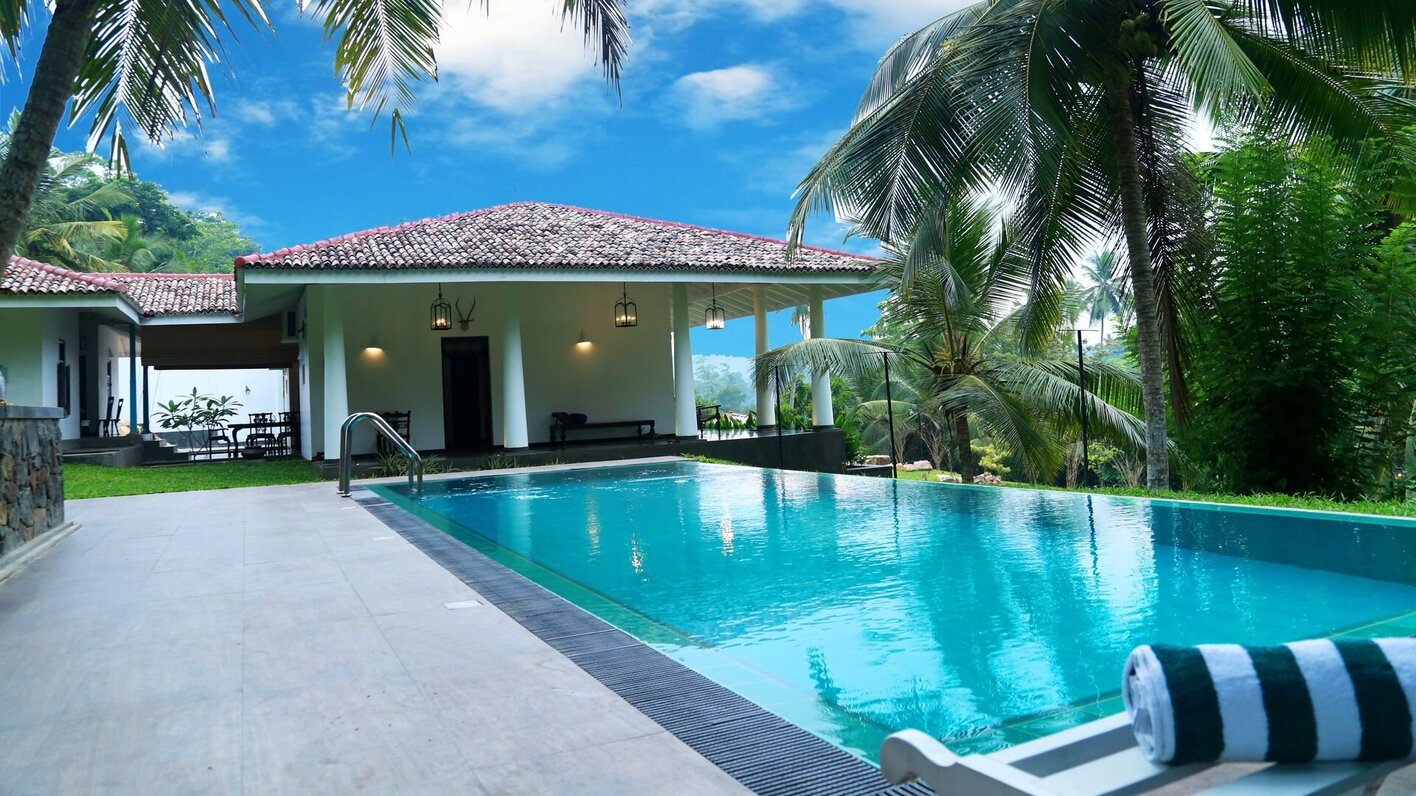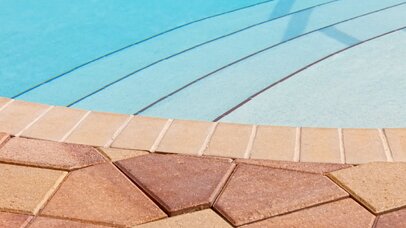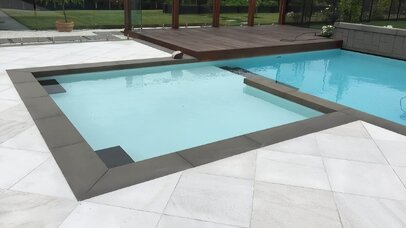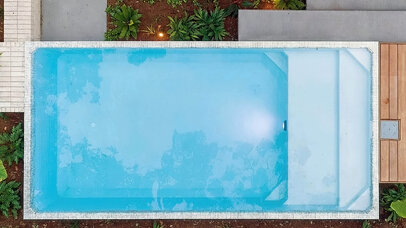Creating the perfect pool area is a significant aspect of backyard design for many homeowners. The choice of material for the pool deck can influence the look and feel of the swimming pool area and the safety, maintenance, and long-term durability. But what material should you use?
This guide will explore the pros and cons of using pavers or concrete around your pool, helping you decide which option best suits your pool surrounds. From the different advantages to safety and cost comparison, we will look at it all! So, let’s jump in!
Why Look At Pavers?
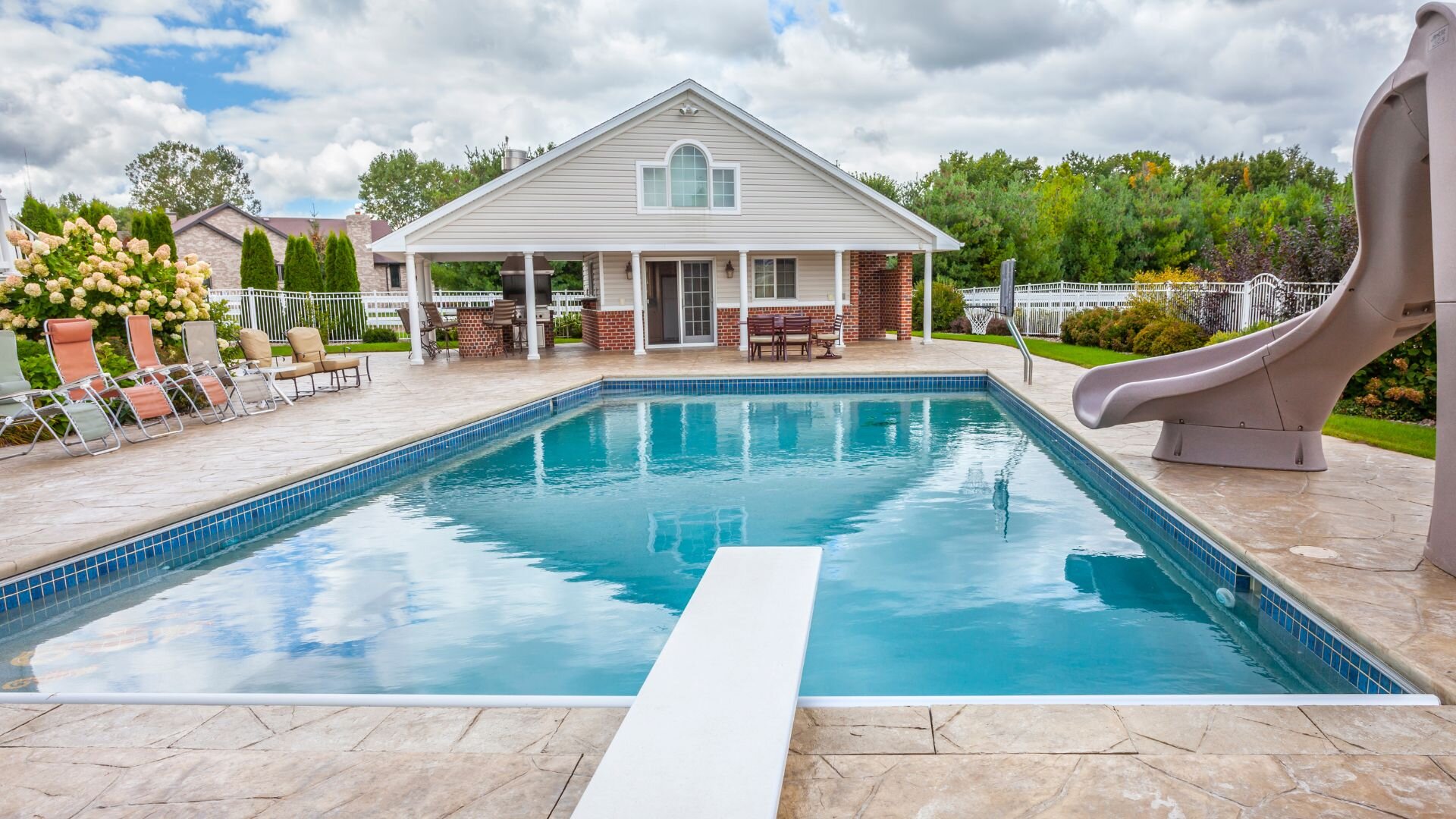
What are Pavers?
Pavers are individual paving stones made from various materials, such as natural stone, brick, or concrete. They can come in numerous shapes, sizes, and colours, offering a range of paver options for those looking to customise their pool deck pavers to their specific aesthetic preferences.
Advantages of Pavers
Pavers are known for their natural beauty and ability to blend seamlessly with the landscaping. They are durable and can withstand the harsh chemicals from the pool without losing their colour or integrity.
Pavers provide a slip-resistant surface around the pool, which is vital for safety. Additionally, if properly installed with polymeric sand, they prevent weeds and are relatively easy to repair since one paver can be removed and replaced without affecting the entire deck.
Disadvantages of Pavers
On the downside, pavers can be more expensive than concrete when considering the cost per square foot. Paver installation is a meticulous process that typically requires a professional installer. Paver ongoing maintenance includes reapplying joint sand and sealing to maintain their pristine appearance.
Using Concrete For Your Pool
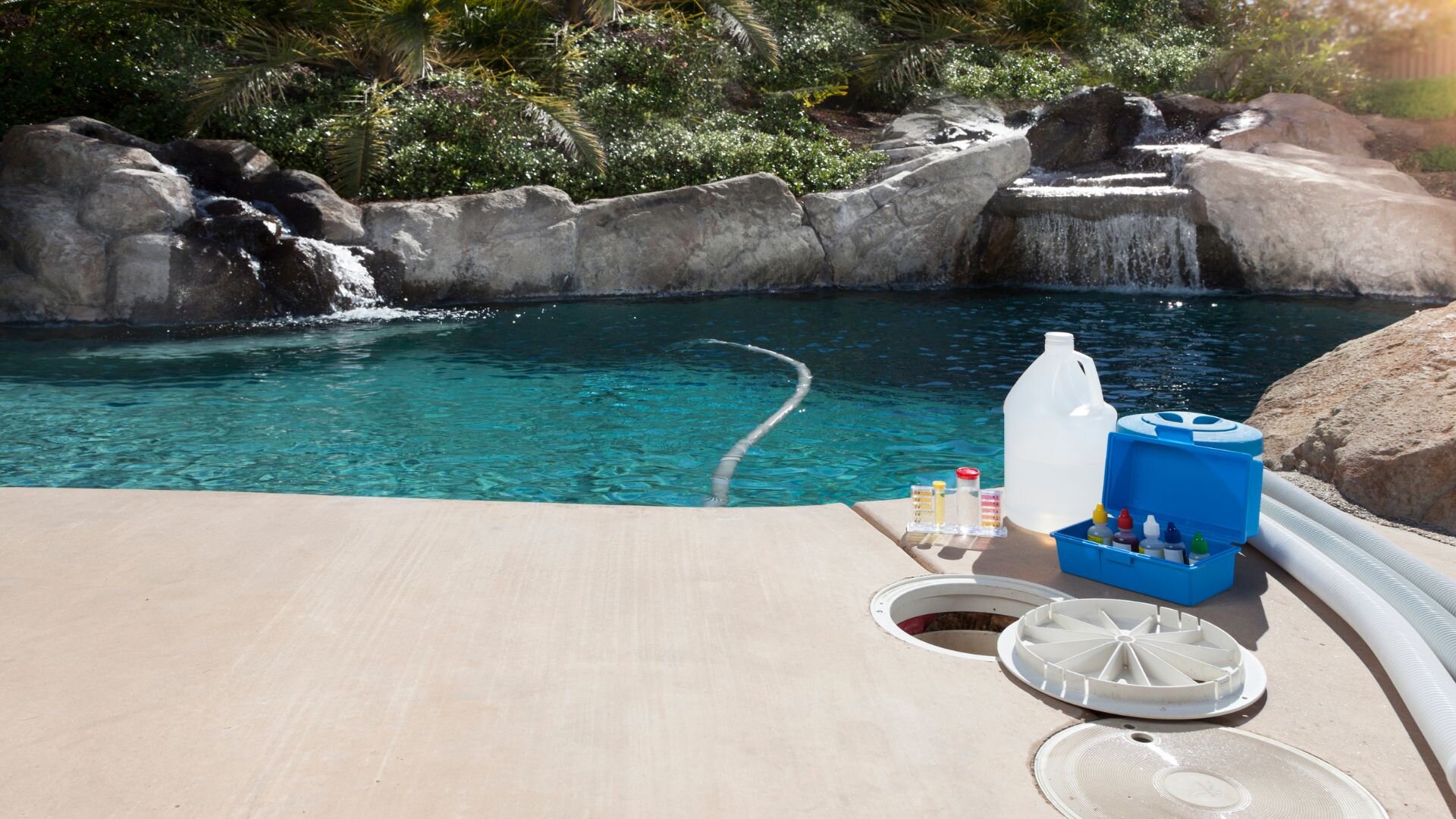
What is Concrete?
Concrete is a composite material comprised of aggregate bonded together with cement. For pool decks, concrete can be finished in various ways, such as textured or stamped concrete, to enhance the design while providing a more slip-resistant surface.
Advantages of Concrete
Concrete slabs offer a cost-efficient solution for a pool deck, providing a solid, uniform surface around the pool. It is versatile in design and can mimic the appearance of more expensive materials like natural stone through stamped concrete techniques. A concrete slab is long-lasting and can provide a safe walking area around the pool when treated with a slip-resistant finish.
Disadvantages of Concrete
Concrete, while durable, is susceptible to cracking over time due to temperature changes and ground movement. A cracked concrete pool deck can be unsightly and require repair or resurfacing. Additionally, concrete can retain heat, making it uncomfortable to walk on during hot days, and if not finished correctly, can be slippery when wet.
Taking A Cost Comparison
Regarding initial installation costs, opting for pavers over concrete can impact your budget more heavily. The individual placement of each paver, coupled with the higher material costs, contributes to a steeper price tag than concrete pool decks, which are less expensive at the outset.
However, potential hidden expenses can arise with concrete, especially if you desire decorative finishes like stamped patterns, which add to the base cost. Conversely, despite potentially lower long-term maintenance expenses for concrete decks, they’re not immune to significant repair costs when issues like cracking occur.
Pool coping is considered the finishing touch when building a pool. It’s the edging or cap they place on the rim of pools. This is an essential finish since it surrounds the pool edge, making the pool come together.
Pavers, in contrast, might call for periodic maintenance, such as resealing or replenishing joint sand. Still, they offer a cost-effective repair approach—since only the compromised pavers need replacing, not the entire surface.
Pool Installation Process
Preparing for Installation
Both pavers and concrete require a properly prepared base to ensure stability and longevity. This includes excavation to the appropriate depth, grading, and compacting the base material.
Pavers Installation Steps
Paver installation involves laying a crushed stone and sand base, placing the pavers in the desired pattern, and filling the joints with polymeric sand. The process must be done carefully to ensure the surface is even, and the pavers are secure.
Concrete Installation Steps
Installing a concrete pool deck involves pouring the concrete into a prepared area and smoothing it out. For stamped concrete, a pattern is impressed into the surface while still wet, and a release agent is sometimes used to prevent sticking. After curing, a sealant is often applied to protect the surface.
Think About Maintenance and Durability
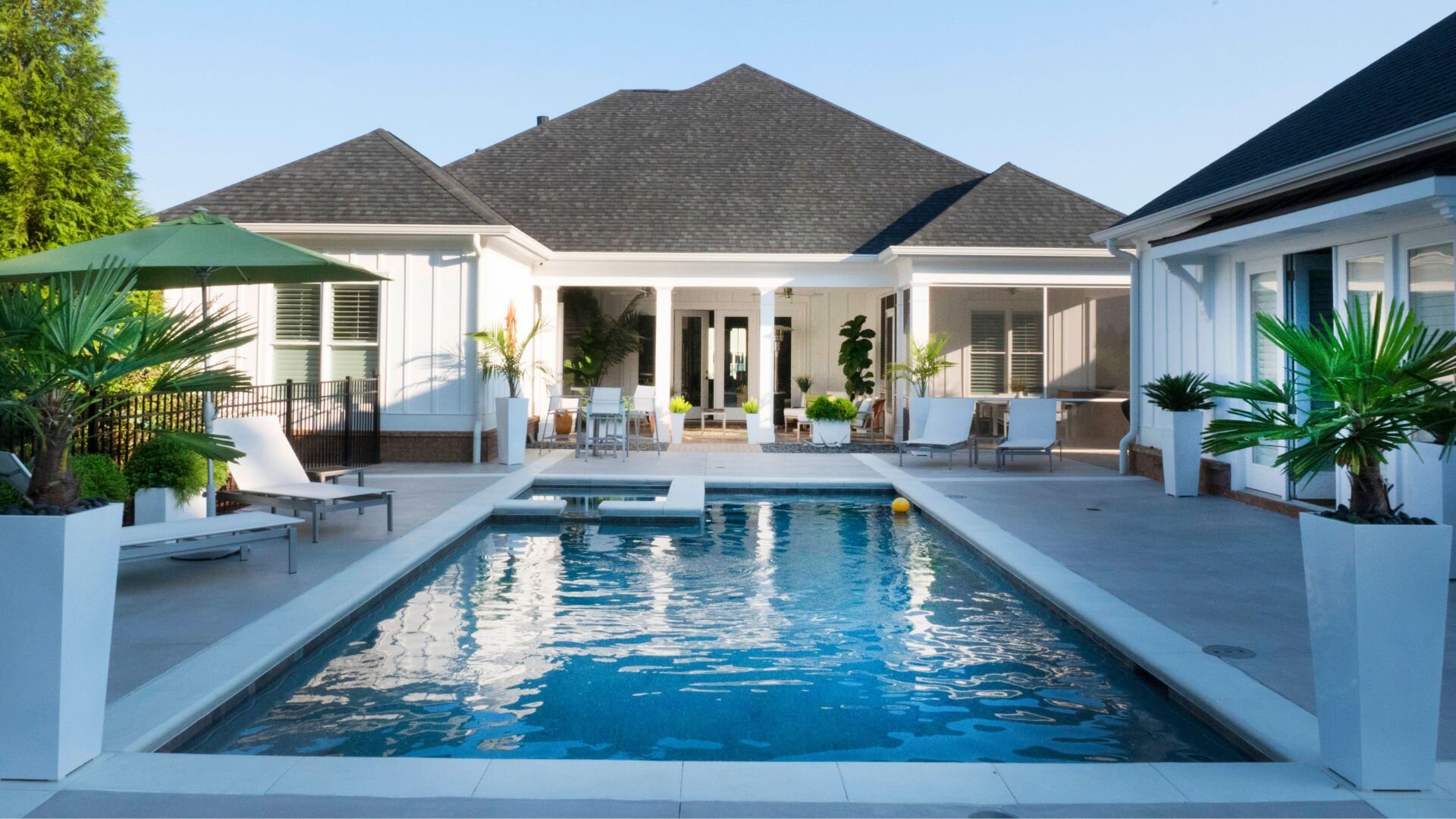
Maintaining Pavers
Pavers require regular cleaning to remove dirt and stains. They may also need periodic sealing to protect against pool chemicals and weather. Polymeric sand should be re-applied when necessary to keep the joints stable and prevent weed growth.
Maintaining Concrete
An existing concrete pool deck requires regular cleaning and occasional resealing to maintain its appearance. Cracks and chips should be addressed promptly to prevent further damage.
Durability of Pavers vs. Concrete
Both pavers and concrete are durable materials suited for a pool deck, but their longevity can vary. Pavers are less likely to show wear because they move independently, which can be advantageous in areas with ground movement.
Concrete is a solid surface, and while strong, it can crack under pressure or due to ground shifts. Proper installation and regular maintenance greatly enhance the durability of both materials.
Aesthetic and Design Possibilities
The design flexibility with pavers is remarkable. They offer homeowners a broad spectrum of colour choices, different textures, and shapes to choose from, enabling them to craft a unique pool deck that harmoniously complements their outdoor living space. Whether one desires the refined elegance natural stone pavers exude or prefers the classic charm of concrete and brick pavers, the options are plentiful and versatile.
Conversely, concrete, which may appear more limited in versatility, has its own design strengths. Techniques such as stamped concrete and various colouring methods can elevate a pool deck to a luxurious aesthetic, skillfully imitating the appearance of natural stone and other upscale materials.
With the expertise of a knowledgeable pool contractor, concrete can be transformed into intricate patterns and sophisticated designs, offering a level of customisation that might surprise those who underrate its potential.
Safety Considerations
Ensuring the safety of a pool deck is paramount, and slip resistance is a key feature that must be considered, especially when the surface becomes wet. Pavers naturally offer a high degree of slip resistance because of their textured surfaces, which makes them a safer option as they are less prone to become slippery when damp, unlike standard concrete finishes.
However, concrete isn’t without its safety measures; when stamped or textured concrete is treated with a slip-resistant sealer, it can, too, become a secure walking area around the pool. Additionally, heat retention is another critical safety and comfort factor for pool decks.
Darker-coloured pavers and concrete can absorb significant heat, becoming uncomfortably hot to the touch under the blazing sun. Opting for lighter-coloured materials or applying a reflective surface treatment can significantly reduce this heat absorption, ensuring that the pool deck remains comfortably cool to walk on, even during the height of summer.
Choosing a Pool Builder or Contractor
Choosing a reputable pool builder or pool contractor is crucial when installing pavers for a new pool or renovating an existing one. Look for professionals with experience in either paver or concrete pool deck installation, as they will understand the nuances of working with the chosen material.
If you use pavers for your pool deck, you may work with landscaping contractors specialising in paver installation. To better understand the materials available, visit a local store specialising in outdoor and landscaping materials or consult with pool deck contractors. Seeing samples in person and discussing your specific needs with experts can help you make an informed decision.
Pool builders or general contractors can usually perform the installation of concrete. Work with a contractor who uses quality materials to ensure your concrete deck lasts as long as possible. In either case, check their previous work references and ensure they’re licensed and insured.
Choose Your Perfect Poolside Paradise with Pavers or Concrete!
When selecting the ideal material for your pool deck, the choice between pavers and concrete is significant. Each offers distinct advantages, whether you’re drawn to the aesthetic versatility and natural elegance of pavers or the seamless durability and customisable concrete options. At The Pool Co, we understand the importance of creating a functional, safe, and beautiful pool area that aligns with your lifestyle and preferences.
Our experienced professionals are dedicated to guiding you through the selection process, ensuring you make an informed decision that enhances your outdoor living experience. We offer a comprehensive range of services, from design consultation to installation, using only the highest-quality materials to bring your dream pool deck to life.
Whether you envision a luxurious natural stone paver design or a sleek, stamped concrete surface, we are here to turn your vision into reality. Contact us today to start crafting the poolside retreat you and your family will enjoy for years.
